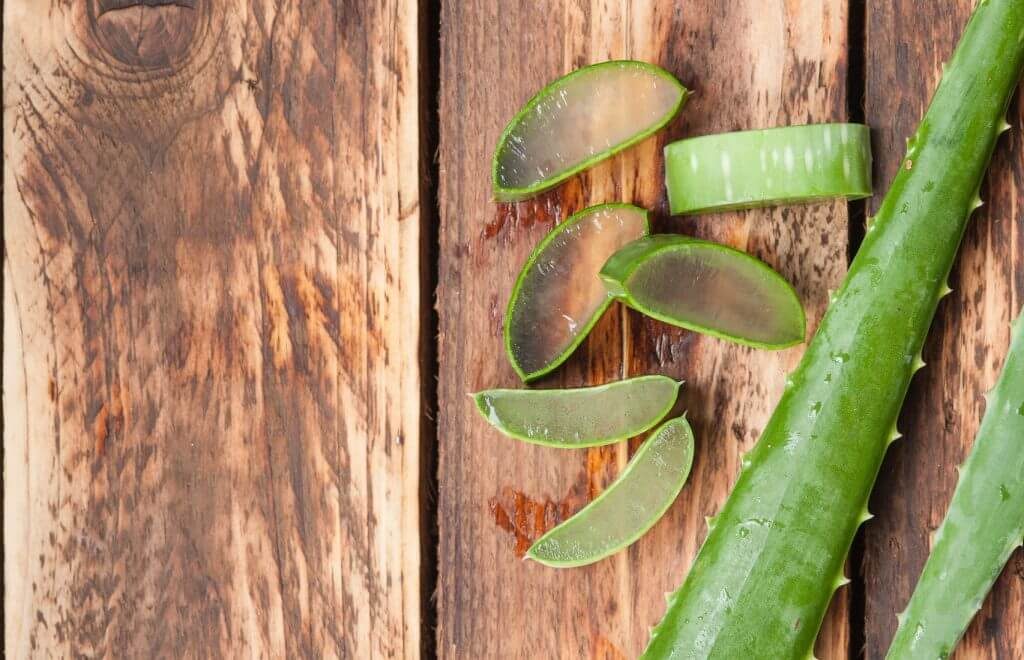You might notice aloe vera listed as a prime ingredient in many beauty products. These aloe facts should help you understand why. The inherent properties of aloe barbadensis miller, more commonly known as the aloe plant, may change the way you take care of your skin and overall health.
There’s a historical precedent for aloe use, and much anecdotal evidence to support aloe vera facts abound. Across various ancient civilizations and cultures, the aloe vera plant has been considered an effective medicinal herb and beauty salve. A succulent plant with a characteristic green-hued leaf,  pure aloe vera was historically used for several applications, from soothing soldiers’ skin wounds to helping to ease constipation.1
pure aloe vera was historically used for several applications, from soothing soldiers’ skin wounds to helping to ease constipation.1
Some of these applications have carried over to today, with people relying on everything from aloe vera gel for their skin to aloe vera juice to supplement their daily diets.
Interested in the host of aloe vera products you’re seeing in the market lately? Here are some aloe vera facts on the potential health benefits this versatile plant might provide for your skin, body, and even your overall wellness. And after learning more aloe vera facts, you may even be tempted to plant aloe vera and grow it for yourself.
What Makes The Aloe Vera Plant So Effective?
First up on this list of aloe vera facts: Getting to know the plant itself. Anatomically, the aloe vera leaf is composed of several layers — a protective rind, a thick aloe latex layer made up of powerful compounds such as aloe-emodin (known to have potent powers in supporting cell renewal and health), and a thick, clear aloe gel composed of water and nutritious enzymes, acids, and vitamins.2
It is these various nutritious components contained in this moisturizing gel or aloe vera extract, that may benefit the skin and body. This makes the aloe vera plant one of the most famously effective and beneficial botanical plants around, and the following aloe vera facts support this.
Tooth And Gum Health
 A study found that aloe vera extract works just as well as chemical-laden mouthwashes. Researchers discovered that the natural ingredients found in the aloe plant were effective against plaque buildup and swollen gums.3,4 Talk to your dentist before giving this a try.
A study found that aloe vera extract works just as well as chemical-laden mouthwashes. Researchers discovered that the natural ingredients found in the aloe plant were effective against plaque buildup and swollen gums.3,4 Talk to your dentist before giving this a try.
Digestion
Aloe latex, the yellow lining underneath this thick succulent’s skin, has been found to contain compounds with a laxative effect. Trials showed that taking aloe latex in some form might help ease constipation. Despite being one of the most popular aloe vera facts, it’s still best to consult with your doctor first before turning to the aloe plant for relief from digestive issues or bowel problems.sup>5,6
Sunburn
One of the best-known aloe vera facts is its reputation as a summer staple. The aloe vera plant is rich in polysaccharides, which have been shown to be beneficial in skin cell repair and renewal. This, coupled with another compound called carboxypeptidase, makes aloe vera such a popular choice for those suffering from sunburn.7
Skin Health
 Aside from using aloe juice or gel to potentially ease the sting of sunburn, aloe vera also contains many beneficial nutrients that might help you put your best face forward, literally. The antioxidants, enzymes, and vitamins in the water-packed aloe vera plant may help moisturize your skin, helping to fortify it against common signs of aging. As it turns out, aloe may also work as a gentle exfoliator to renew and revitalize skin suffering from dullness.8
Aside from using aloe juice or gel to potentially ease the sting of sunburn, aloe vera also contains many beneficial nutrients that might help you put your best face forward, literally. The antioxidants, enzymes, and vitamins in the water-packed aloe vera plant may help moisturize your skin, helping to fortify it against common signs of aging. As it turns out, aloe may also work as a gentle exfoliator to renew and revitalize skin suffering from dullness.8
Dandruff
Since it is both an effective exfoliant and source of nutrient-rich moisture, aloe gel may also help ease the scaliness brought about by dandruff. Simply rub some aloe vera gel on the affected areas on the scalp.9,10
How To Choose The Best Aloe Vera Products
 While simply cutting a thick leaf off the plant itself and scooping out the gel inside is a good way to access aloe’s potential powers, you’d also do well to add aloe vera-based products into your daily skincare regimen.
While simply cutting a thick leaf off the plant itself and scooping out the gel inside is a good way to access aloe’s potential powers, you’d also do well to add aloe vera-based products into your daily skincare regimen.
Now, it’s in your best interest to make sure you’re getting pure aloe vera gel and high-quality aloe-based skincare products. Check the ingredients carefully to make sure you’re getting good-quality aloe vera and that additives and preservatives are as limited as possible.11
Learn More:
Sources
1. https://www.ncbi.nlm.nih.gov/pmc/articles/PMC2763764/
2. https://www.ncbi.nlm.nih.gov/pmc/articles/PMC2763764/
3. https://www.ncbi.nlm.nih.gov/pubmed/24795515
4. https://www.ncbi.nlm.nih.gov/pmc/articles/PMC6330525/
5. https://www.ncbi.nlm.nih.gov/books/NBK92765/
6. https://www.ncbi.nlm.nih.gov/books/NBK92765/
7. https://www.prevention.com/beauty/skin-care/a25995450/aloe-vera-benefits-for-skin/
8. https://www.bcm.edu/news/skin-and-hair/benefits-of-using-aloe-vera
9. https://www.bcm.edu/news/skin-and-hair/benefits-of-using-aloe-vera
10. https://www.prevention.com/beauty/skin-care/a25995450/aloe-vera-benefits-for-skin/
11. https://thebestorganicskincare.com/how-to-choose-the-best-pure-aloe-vera-gel/
























































